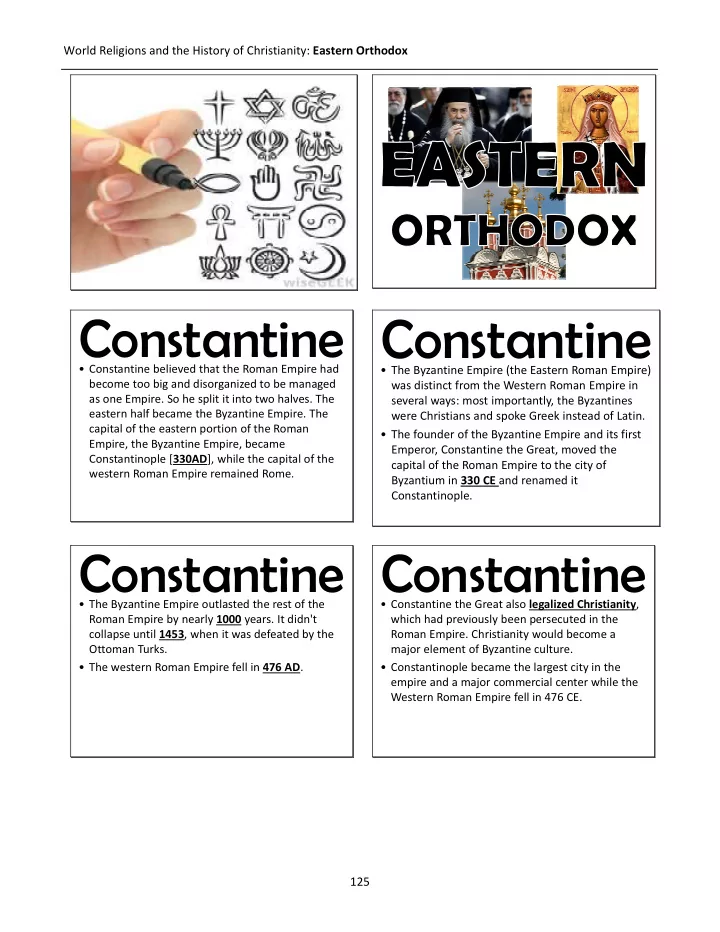

World Religions and the History of Christianity: Eastern Orthodox ����������� ����������� • Constantine believed that the Roman Empire had • The Byzantine Empire (the Eastern Roman Empire) become too big and disorganized to be managed was distinct from the Western Roman Empire in as one Empire. So he split it into two halves. The several ways: most importantly, the Byzantines eastern half became the Byzantine Empire. The were Christians and spoke Greek instead of Latin. capital of the eastern portion of the Roman • The founder of the Byzantine Empire and its first Empire, the Byzantine Empire, became Emperor, Constantine the Great, moved the Constantinople [ 330AD ], while the capital of the capital of the Roman Empire to the city of western Roman Empire remained Rome. Byzantium in 330 CE and renamed it Constantinople. ����������� ����������� • The Byzantine Empire outlasted the rest of the • Constantine the Great also legalized Christianity , Roman Empire by nearly 1000 years. It didn't which had previously been persecuted in the collapse until 1453 , when it was defeated by the Roman Empire. Christianity would become a Ottoman Turks. major element of Byzantine culture. • The western Roman Empire fell in 476 AD . • Constantinople became the largest city in the empire and a major commercial center while the Western Roman Empire fell in 476 CE. 125
World Religions and the History of Christianity: Eastern Orthodox ��������� ����������� • At the Battle of Tours near Poitiers, France, • Charlemagne (c.742-814), also known as Karl and Frankish leader Charles Martel , a Christian, Charles the Great, was a medieval emperor who defeats a large army of Spanish Moors, halting the ruled much of Western Europe from 768 to 814. Muslim advance into Western Europe. • When the people of western Europe awoke on • His grandson Charlemagne carved out a vast December 26, 800 , they had an emperor again. empire that stretched across Europe. On Christmas Day, as King Charles of France knelt in prayer before the altar of the church of St. Peter's in Rome, Pope Leo III suddenly placed a golden crown on his head. 126
World Religions and the History of Christianity: Eastern Orthodox � �� ��������������������� � �� ������ ��� � �� �������������� ��� ��������������� ��� ������� ������ �� ��� � � �������������� ��� � � �������������� !�"#!�� � � ������ ��� 127
World Religions and the History of Christianity: Eastern Orthodox 128
World Religions and the History of Christianity: Eastern Orthodox $%&# $���# • Miaphysitism is a Christological formula • Monophysitism is an error concerning of the Oriental Orthodox Churches. the nature of Christ that asserts Jesus Miaphysitism holds that in the one had only one nature and not two as is person of Jesus Christ, Divinity and taught in the correct doctrine of the Humanity are united in one nature, the hypostatic union: Jesus is both God and two being united without separation, man in one person. In monophysitism, without confusion, and without the single nature was divine and not alteration. human. $���'$%&# $���'$%&# • The Oriental Orthodox Churches • Historically, Chalcedonian Christians have considered Miaphysitism in themselves reject this characterization. They prefer the term non- general to be [agreeable] to an Chalcedonians. orthodox interpretation, but they have nevertheless perceived the Miaphysitism of the non-Chalcedonians to be a form of Monophysitism. 129
World Religions and the History of Christianity: Eastern Orthodox ���(�# Assyrian Church Oriental Church Mia- / Ephesus Mono- / Chalcedon 130
World Religions and the History of Christianity: Eastern Orthodox ��)�%� ����%&� • The Russian Orthodox Church, part of • “Coptic” means “Egyptian,” and the Eastern Orthodox Church. Christians living in Egypt identify themselves as Coptic Christians. As a denomination they originated in the city of Alexandria, one of the most faithful, respected, and fruitful cities during the Apostolic Period. *���+ ��$&� • There are currently 23 sui juris churches that make • The name Greek Orthodox Church or Greek up the Catholic Church. Orthodoxy , is a term referring to the body of several Churches within the larger communion of • 22 of these 23 churches are Eastern churches; only Eastern Orthodox Christianity, whose liturgy is or the Latin church is Western. But the primary was traditionally conducted in Koine Greek, the reason most people don’t know about all these original language of the New Testament, and Eastern churches is that the Latin Catholic church makes up 98% of all Catholics worldwide. whose history, traditions, and theology are rooted in the early Church Fathers and the culture of the Byzantine Empire. ��$&� �&����� • Another thing that people often confuse is the • The Orthodox Church is not a single church but difference between a “rite” and a “church”. The rather a family of 13 "autocephalous," or self- churches above are NOT rites; instead they each governing, churches. They are united in their practice a rite. A rite is a liturgical patrimony: it is understanding of the sacraments, doctrine, liturgy, the way in which a church worships. There are and church government, but each administers its primarily six different rites within the Catholic own affairs. church (with many variations within the different churches). �&����� • The nature of the Eastern Orthodox Church is conciliar rather than monarchical. That is, the patriarchs all hold equal authority in the Church and there is no centralized headquarters from which jurisdiction is maintained. Because the Ecumenical Patriarch—believed to be the first in honor among Orthodox patriarchs—is the Patriarch of Constantinople, Istanbul may be considered the spiritual center of the Orthodox communities. 131
World Religions and the History of Christianity: Eastern Orthodox ��������������������� �������������������� ����������������� ���������������� ������������������� ��������������������� �&����� •The Nicene- Constantinopolitan Creed •http://www.antiochian.org/674 132
World Religions and the History of Christianity: Eastern Orthodox 133
World Religions and the History of Christianity: Eastern Orthodox 134
Recommend
More recommend